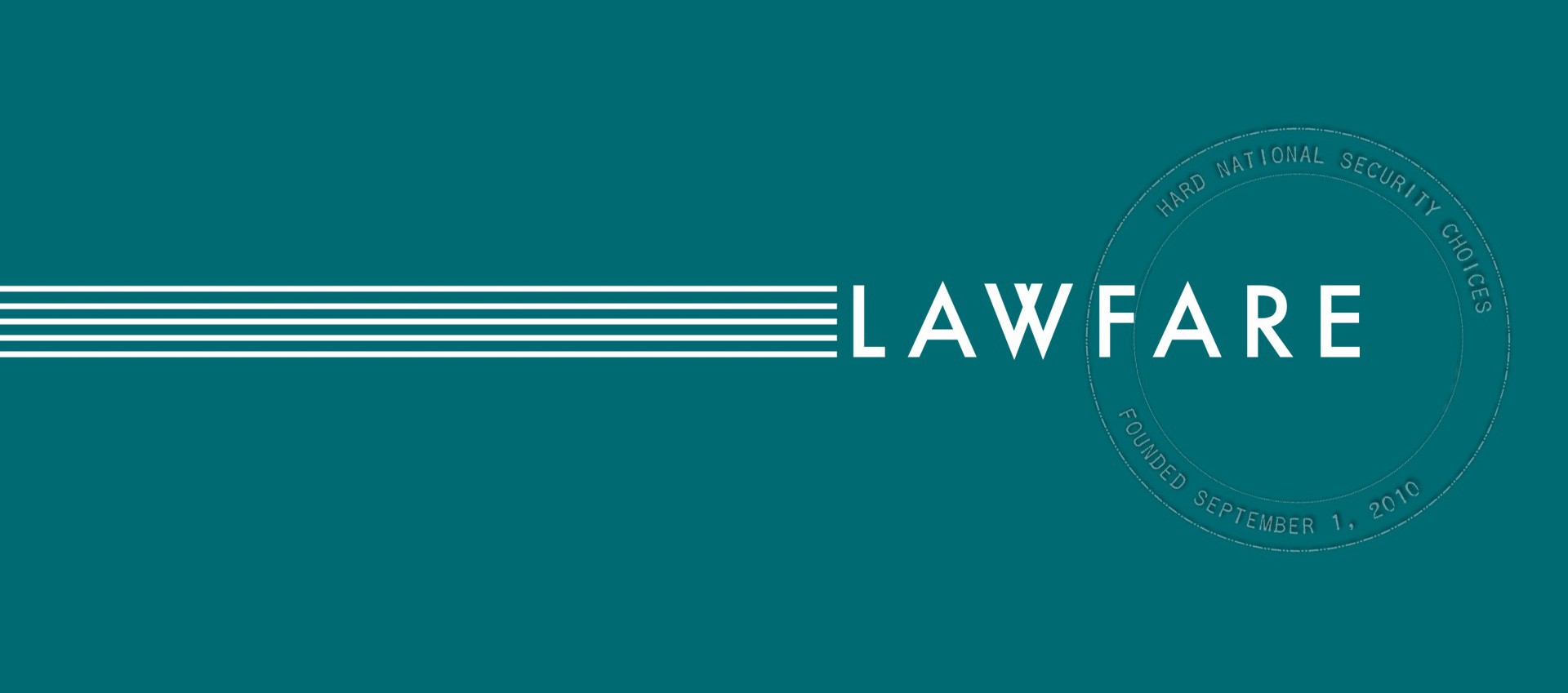The Week That Was: All of Lawfare in One Post
Your weekly summary of everything on the site.

Published by The Lawfare Institute
in Cooperation With

Eugenia Lostri and Stephanie Pell outlined the five pillars of the Biden-Harris Administration’s new national cybersecurity strategy, and discussed how it seeks to make fundamental changes to underlying dynamics of the digital ecosystem.
Jim Dempsey discussed the issue of holding software creators liable for releasing unsecured, vulnerable software, as recommended in the Biden-Harris Administration’s new national cybersecurity strategy.
Katherine Pompilio shared the Biden administration’s new National Cybersecurity Strategy. The strategy intends to address threats while enabling innovation and “secure the full benefits of a safe and secure digital ecosystem for all Americans.”
Michael Stern analyzed former Vice President Mike Pence’s attempt to resist a Justice Department subpoena, in connection with the Jan. 6 investigation, under the Constitution’s Speech and Debate Clause.
Benjamin Wittes sat down with Scott R. Anderson, Quinta Jurecic, and Dominic Solari on the Lawfare Podcast to discuss the D.C. Circuit Court battle over the FBI’s seizure of Rep. Scott Perry’s (R-Pa.) cell phone.
Solari reviewed arguments raised in a case brought by the Department of Justice to access the personal cell phone of Rep. Scott Perry (R-Pa.) in furtherance of the Department’s investigation of the Jan. 6 insurrection.
John Emmons shared the Justice Department’s brief of amicus curiae filed in Thompson v. Trump, recommending that the D.C. Court of Appeals uphold the district court’s judgment that former President Trump is not immune from liability for his speech on Jan. 6.
Paul Rosenzweig discussed the merits and authority of the Data Protection Review Court (DPRC), created by the Biden Administration for citizens of the European Union to challenge harmful practices of American intelligence gathering agencies.
Wittes moderated a discussion at the Brookings Institution featuring Assistant Attorney General for National Security Matthew Olsen to discuss the reauthorization of Foreign Intelligence and Surveillance Act Section 702—now available on the Lawfare Podcast. Audio from this event begins with an introduction by Camille Busette and initial remarks from Olsen.
Emmons shared a letter from the attorney general and director of national intelligence to congressional leadership urging reauthorization of FISA Section 702 and a corresponding White House statement from National Security Advisor Jake Sullivan voicing administration support for the statute’s reauthorization.
Jurecic sat down with Rodrigo Barrenechea on the Lawfare Podcast to discuss the political crisis in Peru, which has resulted in the arrest of former President Pedro Castillo, and widespread protests.
Dean Jackson and João Guilherme Bastos dos Santos discussed lessons learned from the parallel efforts to violently overturn election results in the United States and Brazil.
Wittes sat down with Nicky Woolf and Max Johnston for an episode of the Lawfare Podcast to discuss the realities of so-called Havana Syndrome, with insights gleaned from the collaborative investigation, “The Sound: Mystery of Havana Syndrome,” produced by Woolf, Goat Rodeo, PRX, and Project Brazen.
Hyemin Han shared the Biden administration's war powers report for 2022, released on March 1. Among other points, the report clarifies a potential discrepancy in the U.S.’s approach to the use of force in Afghanistan under international law.
In the latest installment of Lawfare’s foreign policy essay series, Reid Pauly and Rose McDermott considered nuclear escalation among great powers through the lens of evolutionary psychology. The authors stressed various psychological factors which could affect even a rational leader’s willingness to risk nuclear escalation.
Sophia Besch, Mathieu Droin, and Sean Monaghan considered the post-Brexit security relationship between the United Kingdom and European Union nations, in the context of Russia’s 2022 incursion on European sovereignty.
John Chappell and Ari Tolany analyzed the Biden administration’s conventional arms transfer (CAT) policy in National Security Memorandum 18, and compared it to previous administrations’ CAT policies.
Noah Greene argued for a non-proliferation treaty between the United States and other nuclear-armed states to prevent an artificial intelligence-enabled arms race resulting in semiautonomous or fully autonomous nuclear weapons.
Ryan Merkley considered the impacts generative artificial intelligence (AI) will have on the art industry and intellectual property law.
Avery Schmitz shared footage from the first hearing of the House Select Committee on the Chinese Communist Party (CCP) which heard preliminary testimony on the threat posed by the CCP to American national security.
On an episode of the Lawfare Podcast, David Priess moderated a live discussion at George Mason University's Michael V. Hayden Center for Intelligence, Policy, and International Security, featuring remarks from Mirriam-Grace MacIntyre and Alan Kohler. They discussed the American National Counterintelligence and Security Center, the People’s Republic of China and its efforts to gather intelligence in the U.S., counterintelligence and science, and more.
On this week’s episode of Rational Security, Anderson, Jurecic, and Alan Rozenshtein sat down with Natalie Orpett to discuss the week’s big national security news stories, including the Department of Energy’s new low-confidence assessment that COVID-19 may have originated in a Wuhan lab, escalating tensions between Israel and the West Bank, the latest slate of culture-war legislation in Florida under Ron DeSantis, and more.
Rachel Alpert, Karam Jardeneh, and Aleksandra Ryshina outlined the U.N. Guiding Principles on Business and Human Rights (UNGP) and identified a predilection among advocates to incorporate environmental protection measures into the framework.
And on an episode of Chatter, David Priess sat down with Richard Haass to discuss his new book, “The Bill of Obligations: The Ten Habits of Good Citizens.” They discussed the decline of democratic norms in the United States and what Americans can do to rejuvenate them, Haass’s tenure at the Council on Foreign Relations, his service in both Bush presidencies, and more.
And that was the week that was.


